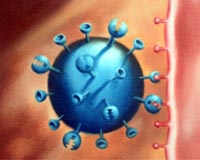| . |  |
. |
Sydney (AFP) Sept 11, 2009 Australian health officials on Friday revealed the country's first case of swine flu resistant to antiviral drug Tamiflu, but insisted the public was not at risk. West Australian (WA) authorities said a 38-year-old Perth man initially responded to the drug but relapsed when the resistant strain developed and is now in critical condition. Chief health officer Tarun Weeramanthri said the case was rare and isolated, and did not pose a risk to the public. "There is no evidence that the virus has spread to other people -- none of the patient's family or hospital staff caring for him have contracted the virus, and he has not been in contact with the wider community," he said. "Experience from overseas shows us that these cases tend to be confined to individual patients and it is not uncommon for it to occur in people who have weakened immune systems." WA Health said there have been 13 reported cases of Tamiflu-resistant swine flu around the world. Australia, now emerging from the southern hemisphere winter, has been hard-hit by swine flu with 169 related deaths among nearly 36,000 cases. The government has ordered 20 million shots -- nearly one per person -- of an under-development flu vaccine which is expected to be available by October.
earlier related report The world's most populous nation, at 1.3 billion, has so far reported nearly 7,000 cases of A(H1N1) influenza but no deaths. It soon plans to launch a nationwide vaccination programme to prevent mass outbreaks of the virus. "According to expert estimates, our nation during the autumn season might have several tens of millions infected with A(H1N1)," Liang Wannian, deputy director of the ministry's health emergency office, told a press conference. Liang said of that total, "half of them could experience clinical symptoms, several millions will seek medical help, and serious cases and fatalities will be unavoidable." The spread of A(H1N1) influenza in China has gathered pace as the autumn months approach, Liang said, with more than half of the nation's nearly 7,000 cases detected between August 24 and September 10. Of those cases, nearly 95 percent were homegrown, whereas the vast majority of cases reported from June to August originated abroad, he said. "The situation we face is not optimistic," Liang said, noting that the virus had been found in all of China's 31 provinces and regions. "We are facing severe challenges in our prevention and control work." The World Health Organization (WHO) said last week that more than 2,800 people had so far died around the globe from swine flu. The virus has been detected in nearly every country. The UN health body says China will be among the first in the world to launch a mass vaccination programme. The government has said it plans to vaccinate 65 million people, or five percent of the total population, before year's end. "What we must work to prevent is a peak explosion of infections in a short period of time -- if this happens, it will be very dangerous," Liang said. "If we see a large number of people infected in a short period of time, then a lot of people are going to seek medical help and our health system will not be able to handle this." The State Council, or cabinet, on Thursday issued new regulations on handling A(H1N1) outbreaks, ordering the ministries of health and education, and the food and drug administration to coordinate prevention and control. Such efforts will focus on schools as China has witnessed more than 200 "large-scale" outbreaks of swine flu since June, with over 85 percent of them occurring in schools or at school-related activities, Liang said. The State Food and Drug Administration has granted approval to Beijing-based Sinovac to mass produce its one-dose swine flu vaccine, and is considering applications from other manufacturers, SFDA spokeswoman Yan Jiangying said. The administration is closely monitoring potential side-effects of vaccinations, and putting in place a procedure to halt the programme should side-effects prove severe or production quality prove faulty, she added. "We will begin emergency inoculations in an active, stable and orderly manner," with priority given to certain groups and in accordance with local outbreak conditions, Liang said, noting that vaccinations would be free. Health Minister Chen Zhu said earlier this week that priority would be given to soldiers, police, children aged five to 19, those with chronic heart and lung diseases, medical workers, quarantine officials, and those working in the railway and aviation sectors. People participating in the festivities to mark the 60th anniversary of the founding of communist China on October 1 will also be given priority. Share This Article With Planet Earth
Related Links Epidemics on Earth - Bird Flu, HIV/AIDS, Ebola
 Swine flu infects cells deep in lungs: study
Swine flu infects cells deep in lungs: studyParis (AFP) Sept 10, 2009 Swine flu can infect cells deeper in the lungs than seasonal flu, thus helping to boost the severity of the illness, a study released on Thursday said. The paper provides the first laboratory corroboration of reports from front-line doctors that some patients with A(H1N1) virus suffer worse symptoms compared to those with run-of-the-mill seasonal flu. Influenza viruses penetrate cells by ... read more |
|
| The content herein, unless otherwise known to be public domain, are Copyright 1995-2009 - SpaceDaily. AFP and UPI Wire Stories are copyright Agence France-Presse and United Press International. ESA Portal Reports are copyright European Space Agency. All NASA sourced material is public domain. Additional copyrights may apply in whole or part to other bona fide parties. Advertising does not imply endorsement,agreement or approval of any opinions, statements or information provided by SpaceDaily on any Web page published or hosted by SpaceDaily. Privacy Statement |